自动化课程简介中英文
自动化课程简介中英文

自动化课程简介中英文自动化课程简介自动化课程简介(Introduction to Automation Course)课程概述(Course Overview):自动化课程是一门介绍自动化技术和应用的基础课程。
该课程旨在帮助学生了解自动化的基本原理、技术和应用,并培养学生在自动化领域的基本能力。
通过本课程的学习,学生将了解自动化的发展历程、自动化系统的组成和工作原理,以及自动化在各个领域的应用。
课程目标(Course Objectives):1. 了解自动化的基本概念和原理;2. 掌握自动化系统的组成和工作原理;3. 熟悉自动化技术在工业、交通、医疗等领域的应用;4. 培养学生在自动化领域的基本技能和实践能力。
课程大纲(Course Syllabus):1. 自动化概述- 自动化的定义和发展历程- 自动化与人工操作的比较- 自动化技术的分类和应用领域2. 自动化系统- 自动化系统的组成和层次结构- 传感器和执行器的原理和应用- 控制器和执行器的选择和配置3. 控制理论基础- 反馈控制原理- 控制系统的稳定性和性能指标- PID控制器的原理和调节方法4. 自动化技术应用- 工业自动化技术- 交通自动化技术- 医疗自动化技术- 农业自动化技术5. 自动化实验- 自动化系统的建模和仿真- 控制器的设计和调试- 自动化系统的性能评估和优化教学方法(Teaching Methods):1. 授课:教师通过讲解理论知识和实际案例,介绍自动化的基本概念和原理。
2. 实验:学生将参与自动化实验,通过实际操作来巩固所学知识,并培养实践能力。
3. 讨论:教师组织学生进行小组讨论,促进学生之间的交流和合作。
评估方式(Assessment Methods):1. 课堂表现:包括课堂参与度、作业完成情况等。
2. 实验报告:学生需撰写实验报告,对实验过程和结果进行分析和总结。
3. 期末考试:考察学生对课程内容的理解和掌握程度。
机械设计制造及其自动化专业课程中英文简介
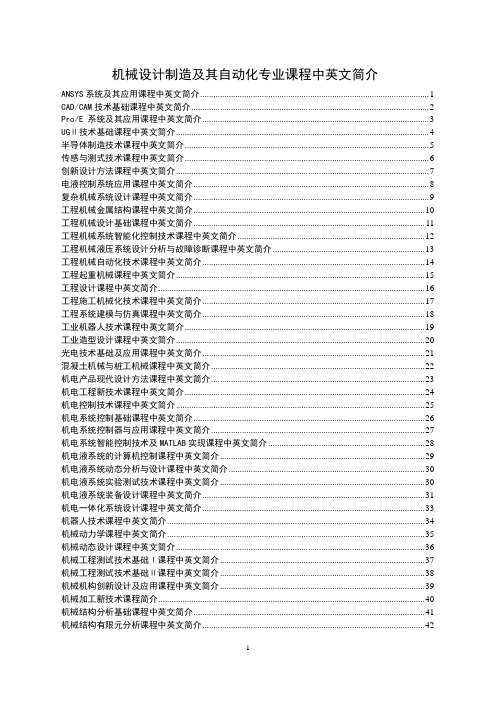
机械设计制造及其自动化专业课程中英文简介ANSYS系统及其应用课程中英文简介 (1)CAD/CAM技术基础课程中英文简介 (2)Pro/E 系统及其应用课程中英文简介 (3)UGⅡ技术基础课程中英文简介 (4)半导体制造技术课程中英文简介 (5)传感与测式技术课程中英文简介 (6)创新设计方法课程中英文简介 (7)电液控制系统应用课程中英文简介 (8)复杂机械系统设计课程中英文简介 (9)工程机械金属结构课程中英文简介 (10)工程机械设计基础课程中英文简介 (11)工程机械系统智能化控制技术课程中英文简介 (12)工程机械液压系统设计分析与故障诊断课程中英文简介 (13)工程机械自动化技术课程中英文简介 (14)工程起重机械课程中英文简介 (15)工程设计课程中英文简介 (16)工程施工机械化技术课程中英文简介 (17)工程系统建模与仿真课程中英文简介 (18)工业机器人技术课程中英文简介 (19)工业造型设计课程中英文简介 (20)光电技术基础及应用课程中英文简介 (21)混凝土机械与桩工机械课程中英文简介 (22)机电产品现代设计方法课程中英文简介 (23)机电工程新技术课程中英文简介 (24)机电控制技术课程中英文简介 (25)机电系统控制基础课程中英文简介 (26)机电系统控制器与应用课程中英文简介 (27)机电系统智能控制技术及MATLAB实现课程中英文简介 (28)机电液系统的计算机控制课程中英文简介 (29)机电液系统动态分析与设计课程中英文简介 (30)机电液系统实验测试技术课程中英文简介 (30)机电液系统装备设计课程中英文简介 (31)机电一体化系统设计课程中英文简介 (33)机器人技术课程中英文简介 (34)机械动力学课程中英文简介 (35)机械动态设计课程中英文简介 (36)机械工程测试技术基础Ⅰ课程中英文简介 (37)机械工程测试技术基础Ⅱ课程中英文简介 (38)机械机构创新设计及应用课程中英文简介 (39)机械加工新技术课程简介 (40)机械结构分析基础课程中英文简介 (41)机械结构有限元分析课程中英文简介 (42)机械设计制造及其自动化专业导论课程中英文简介 (44)机械数字化设计与仿真课程中英文简介 (45)机械系统传动技术课程中英文简介 (46)机械系统机构设计与结构设计课程中英文简介 (47)机械系统设计课程中英文简介 (48)机械系统自动控制技术课程中英文简介 (49)机械优化设计课程中英文简介 (50)机械振动课程中英文简介 (51)机械振动基础课程中英文简介 (52)机械制造技术基础Ⅰ课程中英文简介 (53)机械制造技术基础Ⅱ课程中英文简介 (54)机械制造装备设计Ⅰ课程中英文简介 (55)机械制造装备设计Ⅱ课程中英文简介 (56)计时仪器检测技术课程中英文简介 (57)计时仪器原理与结构课程中英文简介 (58)计时仪器造型艺术设计课程中英文简介 (59)计时仪器制造技术课程中英文简介 (60)计算机辅助工艺过程设计课程中英文简介 (61)精密和超精密加工技术课程中英文简介 (62)开放式智能加工系统课程中英文简介 (64)快速原型制造技术课程中英文简介 (65)摩擦学基础课程简介 (67)纳米科学与技术课程中英文简介 (68)纳米摩擦学与纳米测量技术课程中英文简介 (69)起重运输与工程机械检测技术课程中英文简介 (70)气动技术应用概论课程中英文简介 (71)气动系统设计课程中英文简介 (72)气压传动及控制课程中英文简介 (73)汽车车身制造技术课程中英文简介 (74)汽车电器与电子技术课程中英文简介 (75)汽车发动机原理课程中英文简介 (76)汽车构造课程中英文简介 (77)汽车理论课程中英文简介 (78)汽车排放与噪声控制课程中英文简介 (79)汽车碰撞与安全课程中英文简介 (80)汽车设计课程中英文简介 (81)汽车试验测试技术课程中英文简介 (82)数控技术课程中英文简介 (83)数字化设计与制造课程中英文简介 (84)特种加工技术课程中英文简介 (85)微机电系统技术基础课程中英文简介 (86)微机械电子系统课程中英文简介 (87)微机械制造技术课程中英文简介 (88)物流设备与技术课程中英文简介 (90)误差理论与数据处理课程中英文简介 (91)先进工艺检测技术课程中英文简介 (92)先进液压传动技术概论课程中英文简介 (94)先进液压控制系统设计课程中英文简介 (95)先进制造技术课程中英文简介 (96)现代机械设计方法课程中英文简介 (97)现代制造技术课程中英文简介 (98)新能源汽车结构与原理课程中英文简介 (99)液力传动课程中英文简介 (100)液压传动课程中英文简介 (101)液压传动系统计算机辅助设计课程中英文简介 (102)液压技术应用课程中英文简介 (103)液压控制系统课程中英文简介 (104)液压元件课程中英文简介 (105)液压元件制造技术课程中英文简介 (106)有限元在车辆工程中的应用课程中英文简介 (107)制造系统自动化技术课程中英文简介 (108)ANSYS系统及其应用课程中英文简介课程编码:SE08112100课程中文名称:ANSYS系统及其应用课程英文名称:Introduction and Application of Ansys总学时:16学分:1.0课程简介:本课主要讲授ANSYS软件主要功能、主要技术特点、支持的图形传递标准、与CAD软件的接口以及运行环境等;ANSYS软件界面下各窗口的功能,ANSYS架构及命令,具体包括简单模型的建立、材料属性输入、单元的选择和划分、求解处理和后置处理;ANSYS软件中坐标系统和坐标平面、节点和元素的定义、负载定义、复杂实体模型的建立方法等;对结构分析结果进行后处理,具体包括绘变形图、支反力列表、绘应力等值线图和网格密度检查等;介绍优化设计的步骤,主要包括生成循环所用的分析文件、参数化建立模型、求解、提取并指定状态变量和目标函数、在ANSYS数据库里建立与分析文件中变量相对应的参数、选择优化工具或优化方法等;简单了解接触问题的定义、接触协调条件、接触单元和一些接触问题的处理方法,面对面问题的建模和处理过程;如何用ANSYS 软件分析计算物体的稳态或瞬态温度分布,以及热量的获取或损失、热梯度、热通量等。
中英文课程描述计算机自动化

课程编号:070305Code: 070305课程名称:单片机及应用Name: Principle and Application of Single Chip Microcomputer (SCM)学时:44讲授学时,12实验学时Hours : 44.00 hrs lecture,12.00 hrs lab学分:3Credit:3.00课程简介:本课程介绍MCS-51单片机的功能结构、工作原理、指令系统、编程技术、接口技术和实际应用。
通过该课程的学习,使学生初步具备简单的单片机应用系统的设计开发能力。
Brief introduction: This course shows the introductions to functional structure, principle, instructions, assemble language programming, interface and application of MCS-51single chip microcomputer. By the study of this course, the students can get the design and development ability of simple SCM application system.课程编号:070306Code : 070306课程名称:计算机原理Name: Principle of Microcomputer学时:72讲授学时,16实验学时Hours : 72.00 hrs lecture,16.00 hrs lab学分:4Credit:4.00课程简介:本课程是计算机科学技术专业的一门专业基础课;该课程介绍主流微机的结构、指令及汇编语言程序设计和常用的接口电路。
Brief introduction: Principle of Microcomputer is a basic course of Computer Science and Technology; The course introduces the structure of the mainstream computer, instructions and assembly language programming and common interface circuit.课程编号:070307Code : 070307课程名称:接口技术Name: Microcomputer Interface Technology学时:28讲授学时,12实验学时Hours : 28.00 hrs lecture,12.00 hrs lab学分:2Credit:2.00课程简介:本课程是计算机应用专业的必修课;该课程介绍微机的总线及接口技术。
用英文介绍一个自动化课程作文
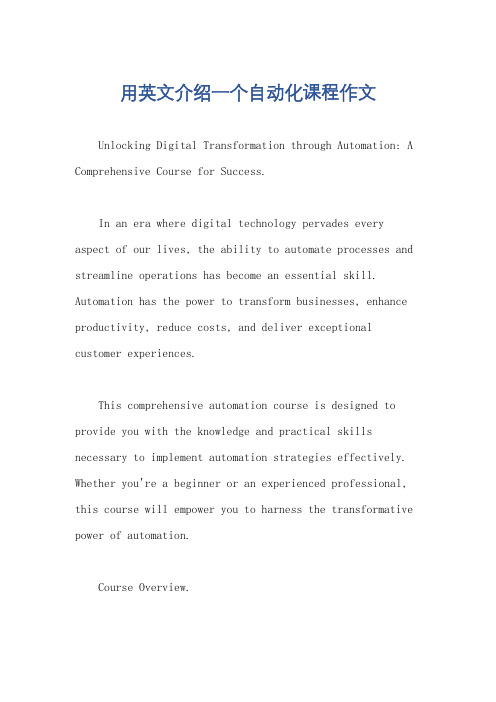
用英文介绍一个自动化课程作文Unlocking Digital Transformation through Automation: A Comprehensive Course for Success.In an era where digital technology pervades every aspect of our lives, the ability to automate processes and streamline operations has become an essential skill. Automation has the power to transform businesses, enhance productivity, reduce costs, and deliver exceptional customer experiences.This comprehensive automation course is designed to provide you with the knowledge and practical skills necessary to implement automation strategies effectively. Whether you're a beginner or an experienced professional, this course will empower you to harness the transformative power of automation.Course Overview.Throughout this course, you will embark on a journey of discovery as we explore the following key concepts:Fundamentals of Automation: Gain a solid understanding of the principles and technologies underlying automation, including robotic process automation (RPA), artificial intelligence (AI), and machine learning (ML).Process Mapping and Identification: Master the art of identifying and documenting business processes suitable for automation. Learn to analyze processes, identify inefficiencies, and develop automation roadmaps.Automation Tools and Platforms: Explore a comprehensive array of automation tools and platforms, including popular solutions for RPA, AI, and ML. Learn to select and implement the most appropriate tools for your specific needs.Implementation and Deployment: Gain hands-on experience in designing, implementing, and deploying automation solutions. Learn best practices for projectmanagement, testing, and change management.Case Studies and Real-World Applications: Engage with real-world case studies and examples to understand how automation has been successfully implemented in various industries and scenarios.Course Objectives.Upon completion of this course, you will be equipped with the following abilities:Identify and prioritize business processes for automation.Select and implement appropriate automation tools and platforms.Design, develop, and deploy automated solutions.Monitor and evaluate the performance of automation initiatives.Understand the ethical and societal implications of automation.Course Benefits.Enhanced Productivity: Automation can free up your time from repetitive and mundane tasks, allowing you to focus on more strategic initiatives.Reduced Costs: By automating tasks, you can eliminate the need for manual labor and reduce operational expenses.Improved Accuracy and Consistency: Automated processes are rule-based and eliminate human errors, leading to greater accuracy and consistency in outcomes.Enhanced Customer Experience: Automation can improve customer service by providing faster response times, personalized experiences, and seamless interactions.Competitive Advantage: Businesses that embraceautomation gain a competitive advantage by operating more efficiently and effectively than their peers.Who Should Take This Course?This course is designed for professionals in various roles who are seeking to enhance their automation skills and knowledge, including:Business process analysts.IT professionals.Operations managers.Project managers.Business owners.Course Format and Delivery.Interactive Lectures: Engage in live or recordedlectures delivered by industry experts.Hands-on Exercises: Practice and reinforce your learning through practical exercises and simulations.Real-World Case Studies: Explore real-life examples of automation success stories.Online Discussions and Collaboration: Connect with fellow learners and share your insights in online forums.Flexible Learning Platform: Access course materials and complete assignments at your own pace on our user-friendly online platform.Enrollment.To enroll in this comprehensive automation course,visit our website and complete the registration process. Upon enrollment, you will be granted access to all course materials and resources.Investment in Your Future.Invest in your professional development and unlock the transformative power of automation. This course will equip you with the skills and knowledge to automate your processes, drive innovation, and achieve exceptional outcomes.Join us today and embark on a transformative journey that will empower you to succeed in the digital age.。
自动化课程简介中英文
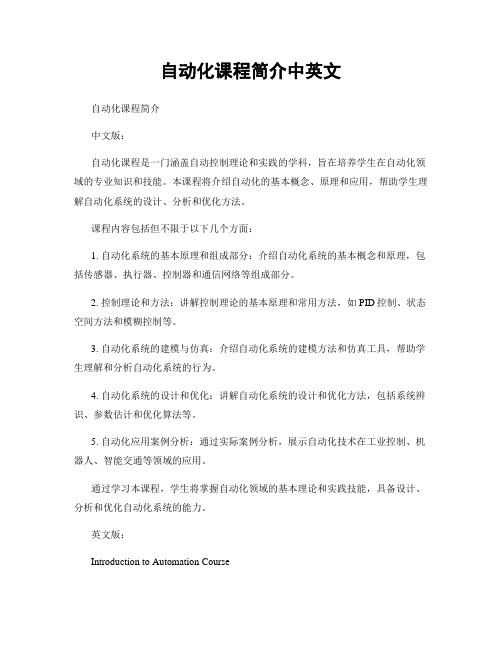
自动化课程简介中英文自动化课程简介中文版:自动化课程是一门涵盖自动控制理论和实践的学科,旨在培养学生在自动化领域的专业知识和技能。
本课程将介绍自动化的基本概念、原理和应用,帮助学生理解自动化系统的设计、分析和优化方法。
课程内容包括但不限于以下几个方面:1. 自动化系统的基本原理和组成部分:介绍自动化系统的基本概念和原理,包括传感器、执行器、控制器和通信网络等组成部分。
2. 控制理论和方法:讲解控制理论的基本原理和常用方法,如PID控制、状态空间方法和模糊控制等。
3. 自动化系统的建模与仿真:介绍自动化系统的建模方法和仿真工具,帮助学生理解和分析自动化系统的行为。
4. 自动化系统的设计和优化:讲解自动化系统的设计和优化方法,包括系统辨识、参数估计和优化算法等。
5. 自动化应用案例分析:通过实际案例分析,展示自动化技术在工业控制、机器人、智能交通等领域的应用。
通过学习本课程,学生将掌握自动化领域的基本理论和实践技能,具备设计、分析和优化自动化系统的能力。
英文版:Introduction to Automation CourseThe Automation course is a discipline that covers the theory and practice of automatic control, aiming to cultivate students' professional knowledge and skills in the field of automation. This course will introduce the basic concepts, principles, and applications of automation, helping students understand the methods for designing, analyzing, and optimizing automation systems.The course content includes, but is not limited to, the following aspects:1. Basic principles and components of automation systems: Introduce the basic concepts and principles of automation systems, including sensors, actuators, controllers, and communication networks.2. Control theory and methods: Explain the basic principles and common methods of control theory, such as PID control, state-space methods, and fuzzy control.3. Modeling and simulation of automation systems: Introduce the modeling methods and simulation tools for automation systems, helping students understand and analyze the behavior of automation systems.4. Design and optimization of automation systems: Explain the methods for designing and optimizing automation systems, including system identification, parameter estimation, and optimization algorithms.5. Case studies of automation applications: Through practical case studies, demonstrate the application of automation technology in industrial control, robotics, intelligent transportation, and other fields.By studying this course, students will acquire a solid understanding of the fundamental theories and practical skills in the field of automation, and develop the ability to design, analyze, and optimize automation systems.。
自动化课程英文描述
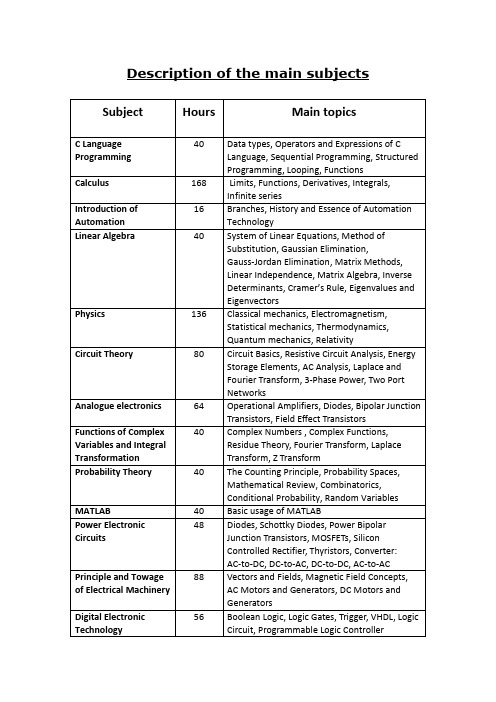
Single-Loop DCMotorControl System, Multi-Loop DCMotorControl System, Reversible DC Motor control System
Robotics
32
Introduction of Ron, Components
Computer Control System
64
Fourier Transform, Z Transform, Stability Analysis of Computer Control System, Analog Design Method of Digital Controller(PID Controller, Smith Predictive Control ), Direct Design Method of Digital Controller
Power Supplyof Industrial Enterprise
48
Calculation ofElectrical Load, Short-Circuit Current and its Calculation,Electrical Substation and Power Supply Network,Overload Protection
自动化课程英文描述课程描述英文自动化专业描述电气自动化课程电气自动化专业课程电气自动化主修课程自动化专业主修课程自动化专业课程电气自动化专业描述自动化专业主要课程
Description of themainsubjects
Subject
Hours
Main topics
C Language Programming
56
中英文课程描述(计算机、自动化)
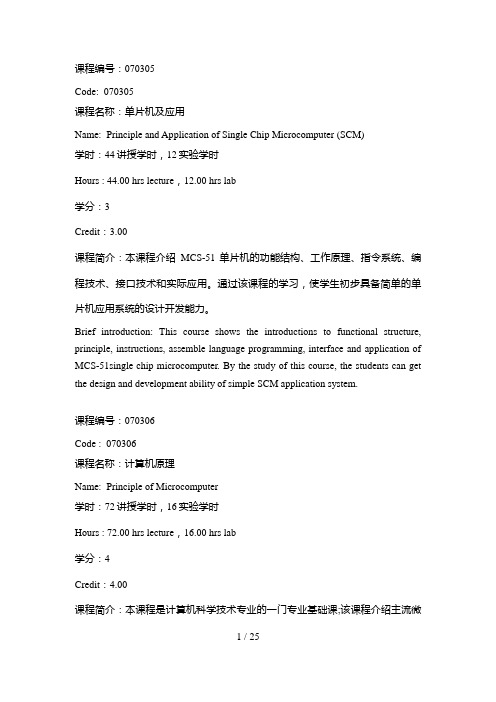
课程编号:070305Code: 070305课程名称:单片机及应用Name: Principle and Application of Single Chip Microcomputer (SCM)学时:44讲授学时,12实验学时Hours : 44.00 hrs lecture,12.00 hrs lab学分:3Credit:3.00课程简介:本课程介绍MCS-51单片机的功能结构、工作原理、指令系统、编程技术、接口技术和实际应用。
通过该课程的学习,使学生初步具备简单的单片机应用系统的设计开发能力。
Brief introduction: This course shows the introductions to functional structure, principle, instructions, assemble language programming, interface and application of MCS-51single chip microcomputer. By the study of this course, the students can get the design and development ability of simple SCM application system.课程编号:070306Code : 070306课程名称:计算机原理Name: Principle of Microcomputer学时:72讲授学时,16实验学时Hours : 72.00 hrs lecture,16.00 hrs lab学分:4Credit:4.00课程简介:本课程是计算机科学技术专业的一门专业基础课;该课程介绍主流微机的结构、指令及汇编语言程序设计和常用的接口电路。
Brief introduction: Principle of Microcomputer is a basic course of Computer Science and Technology; The course introduces the structure of the mainstream computer, instructions and assembly language programming and common interface circuit.课程编号:070307Code : 070307课程名称:接口技术Name: Microcomputer Interface Technology学时:28讲授学时,12实验学时Hours : 28.00 hrs lecture,12.00 hrs lab学分:2Credit:2.00课程简介:本课程是计算机应用专业的必修课;该课程介绍微机的总线及接口技术。
自动化课程英文描述

自动化课程英文描述Title: English Description of Automation CourseIntroduction:The field of automation has witnessed significant advancements in recent years, revolutionizing industries and transforming the way we live and work. This article aims to provide a comprehensive and accurate description of an automation course, highlighting its key components and benefits.I. Course Overview:1.1 Introduction to Automation:- Definition and significance of automation in various industries.- Overview of automation technologies and their applications.- Understanding the role of automation in improving efficiency and productivity.1.2 Fundamentals of Control Systems:- Introduction to control systems and their importance in automation.- Study of different types of control systems, such as open-loop and closed-loop.- Analysis of control system components, including sensors, actuators, and controllers.1.3 Programming for Automation:- Introduction to programming languages commonly used in automation, such as Python and C++.- Understanding the basics of algorithm development and logic programming.- Practical exercises and projects to enhance programming skills for automation.II. Industrial Automation:2.1 Industrial Robotics:- Study of robotic systems used in industrial automation.- Understanding the principles of robotic programming and control.- Analysis of robotic applications in manufacturing, logistics, and healthcare sectors.2.2 PLC Programming:- Introduction to Programmable Logic Controllers (PLCs) and their role in industrial automation.- Understanding ladder logic programming and its applications.- Hands-on experience in designing and implementing PLC programs.2.3 SCADA Systems:- Overview of Supervisory Control and Data Acquisition (SCADA) systems.- Understanding the architecture and components of SCADA systems.- Practical exercises to develop skills in SCADA system configuration and monitoring.III. Process Automation:3.1 Process Control:- Introduction to process control and its importance in industries like oil and gas, chemical, and pharmaceutical.- Study of different control strategies, such as feedback and feedforward control.- Analysis of process control loops and tuning techniques.3.2 Distributed Control Systems (DCS):- Overview of Distributed Control Systems and their applications in process automation.- Understanding the architecture and components of DCS.- Hands-on experience in configuring and programming DCS systems.3.3 Industrial Communication Networks:- Study of communication protocols used in process automation, such as Modbus and Profibus.- Understanding the principles of network design and troubleshooting.- Practical exercises to develop skills in configuring and troubleshooting industrial communication networks.IV. Home and Building Automation:4.1 Smart Home Systems:- Introduction to smart home automation and its benefits.- Understanding the components and technologies used in smart home systems.- Analysis of home automation applications, including security, energy management, and entertainment.4.2 Building Management Systems (BMS):- Overview of Building Management Systems and their role in commercial buildings.- Understanding the integration of various building systems, such as HVAC, lighting, and security.- Hands-on experience in configuring and programming BMS systems.4.3 Internet of Things (IoT) in Automation:- Study of IoT technologies and their applications in automation.- Understanding the principles of sensor integration and data analytics.- Practical exercises to develop skills in IoT-based automation systems.V. Emerging Trends in Automation:5.1 Artificial Intelligence in Automation:- Overview of AI technologies and their impact on automation.- Understanding machine learning algorithms and their applications.- Analysis of AI-driven automation in industries like healthcare, finance, and transportation.5.2 Robotic Process Automation (RPA):- Introduction to RPA and its role in automating repetitive tasks.- Understanding the implementation and benefits of RPA in business processes.- Hands-on experience in designing and deploying RPA solutions.5.3 Automation in the Future:- Discussion on the future prospects of automation.- Analysis of emerging technologies, such as autonomous vehicles and smart cities.- Understanding the ethical and societal implications of automation advancements.Conclusion:In conclusion, an automation course provides a comprehensive understanding of the principles, technologies, and applications of automation in various industries. By equipping students with practical skills and knowledge, this course prepares them for a promising career in the rapidly evolving field of automation.。
- 1、下载文档前请自行甄别文档内容的完整性,平台不提供额外的编辑、内容补充、找答案等附加服务。
- 2、"仅部分预览"的文档,不可在线预览部分如存在完整性等问题,可反馈申请退款(可完整预览的文档不适用该条件!)。
- 3、如文档侵犯您的权益,请联系客服反馈,我们会尽快为您处理(人工客服工作时间:9:00-18:30)。
自动化课程简介中英文
Title: Introduction to Automation Course (English and Chinese)
Introduction:
Automation is a rapidly growing field that involves the use of technology to control and monitor processes. Understanding automation is essential for anyone looking to work in industries such as manufacturing, engineering, or technology. In this article, we will provide an overview of an automation course, including its objectives, content, and benefits.
1. Course Objectives
1.1 Understand the basics of automation technology
1.2 Learn how to design and implement automated systems
1.3 Gain practical experience in using automation tools and software
2. Course Content
2.1 Introduction to automation principles and concepts
2.2 Sensors and actuators used in automation
2.3 Programmable Logic Controllers (PLCs) and Human Machine Interfaces (HMIs)
3. Course Benefits
3.1 Increased job opportunities in industries that use automation technology
3.2 Improved efficiency and productivity in the workplace
3.3 Enhanced problem-solving skills through hands-on experience with automation systems
4. Course Delivery
4.1 Lectures and demonstrations by industry experts
4.2 Hands-on practical sessions in a lab setting
4.3 Group projects to apply knowledge gained in the course
5. Conclusion
In conclusion, an automation course provides students with the knowledge and skills needed to succeed in today's technology-driven world. By understanding automation principles and gaining practical experience, students will be well-equipped to pursue careers in industries that rely on automation technology. Whether you are a beginner or an experienced professional, taking an automation course can help you stay competitive in the job market.
自动化课程简介
引言:
自动化是一个快速发展的领域,涉及使用技术来控制和监控过程。
了解自动化对于希翼在创造业、工程或者技术行业工作的人来说至关重要。
在本文中,我们将介绍一门自动化课程的概述,包括其目标、内容和好处。
1. 课程目标
1.1 理解自动化技术的基础知识
1.2 学习如何设计和实施自动化系统
1.3 获得使用自动化工具和软件的实践经验
2. 课程内容
2.1 自动化原理和概念介绍
2.2 自动化中使用的传感器和执行器
2.3 可编程逻辑控制器(PLC)和人机界面(HMI)
3. 课程好处
3.1 在使用自动化技术的行业中增加就业机会
3.2 提高工作场所的效率和生产力
3.3 通过与自动化系统的实际操作经验增强解决问题的能力
4. 课程交付方式
4.1 由行业专家进行讲座和演示
4.2 在实验室环境中进行实践操作
4.3 团队项目,应用课程中所学知识
5. 结论
总之,自动化课程为学生提供了在当今技术驱动的世界中取得成功所需的知识和技能。
通过理解自动化原理并获得实际操作经验,学生将能够在依赖自动化技术的行业中追求职业生涯。
无论您是初学者还是经验丰富的专业人士,参加自动化课程都有助于您在就业市场上保持竞争力。
